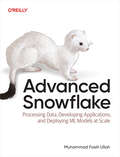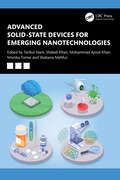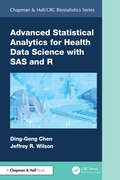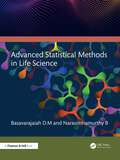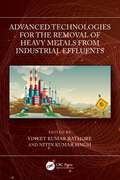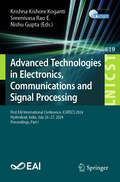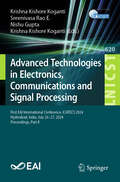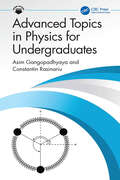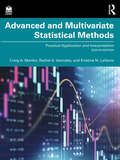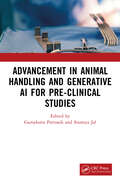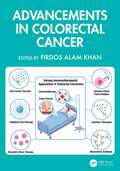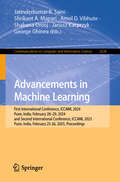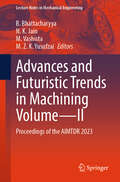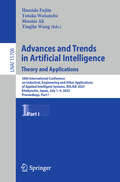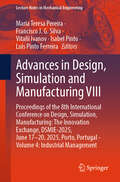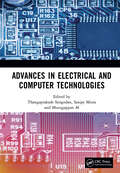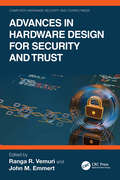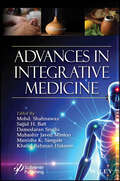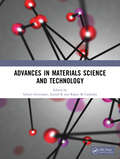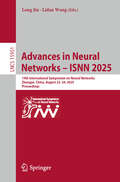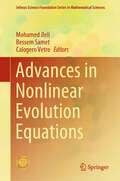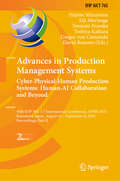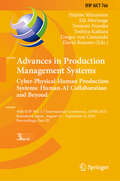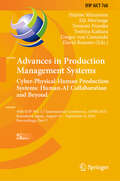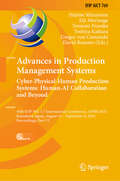- Table View
- List View
Advanced Snowflake
by Muhammad Fasih UllahAs Snowflake's capabilities expand, staying updated with its latest features and functionalities can be overwhelming. The platform's rapid development gave rise to advanced tools like Snowpark and the Native App Framework, which are crucial for optimizing data operations but may seem complex to navigate. In this essential book, author Muhammad Fasih Ullah offers a detailed guide to understanding these sophisticated tools, ensuring you can leverage the full potential of Snowflake for data processing, application development, and deploying machine learning models at scale. You'll gain actionable insights and structured examples to transform your understanding and skills in handling advanced data scenarios within Snowflake. By the end of this book, you will: Grasp advanced features such as Snowpark, Snowflake Native App Framework, and Iceberg tables Enhance your projects with geospatial functions for comprehensive geospatial analytics Interact with Snowflake using a variety of programming languages through Snowpark Implement and manage machine learning models effectively using Snowpark ML Develop and deploy applications within the Snowflake environment
Advanced Solid-state Devices for Emerging Nanotechnologies
by Tarikul Islam, Shakeb Khan, Mohammad Ajmal Khan and Monika Tomar and Shabana MehfuzAdvanced Solid-state Devices for Emerging Technologies provides a comprehensive overview of the transformative role played by nanotechnology in the development of solid-state devices for various applications, including efficient signal processing, power, data communication, sensor and IoT-enabled devices. The introductory section of the book provides the fundamental working principles of the solid-state devices for signal processing, energy harvesting and sensing of stimulants, highlighting their significance for addressing some of the present challenges. The book also discusses the key structures of the devices with different functional units, the role of basic and functionalized nanomaterials in enhancing their performance, with diverse applications potential for sensing, powering devices and signal processing. Other aspects covered include the experimental methods, procedures in determining the response parameters of the devices and the application of artificial intelligence in modelling and optimization of system parameters. The proposed book is useful for researchers, graduate students, and undergraduate students, working technical professionals in engineering and the sciences.Key Features: Discusses advanced materials and structures for developing emerging technologies for micro and nano applications Development of efficient interfacing and signal processing circuits with the idea of machine learning-based sensor data and fault analysis Covers open research challenges and the future scope of research directions on emerging micro to nano technology
Advanced Statistical Analytics for Health Data Science with SAS and R (Chapman & Hall/CRC Biostatistics Series)
by Ding-Geng (Din) Chen Jeffrey WilsonIn recent years, there has been a growing emphasis on making statistical methods and analytics accessible to health data science researchers and students. Following the first book on "Statistical Analytics for Health Data Science with SAS and R" (2023, www.routledge.com/9781032325620), this book serves as a comprehensive reference for health data scientists, bridging fundamental statistical principles with advanced analytical techniques. By providing clear explanations of statistical theory and its application to real- world health data, we aim to equip researchers with the necessary tools to navigate the evolving landscape of health data science.Designed for advanced-level data scientists, this book covers a wide range of statistical methodologies, including models for longitudinal data with time-dependent covariates, multi-membership mixed-effects models, statistical modeling of survival data, Bayesian statistics, joint modeling of longitudinal and survival data, nonlinear regression, statistical meta-analysis, spatial statistics, structural equation modeling, latent growth curve modeling, causal inference, and propensity score analysis.A key feature of this book is its emphasis on real-world applications. We integrate publicly available health datasets and provide case studies from a variety of health applications. These practical examples demonstrate how statistical methods can be applied to solve critical problems in health science.To support hands-on learning, we offer implementation guidance using SAS and R, ensuring that readers can replicate analyses and apply statistical techniques to their own research. Step-by-step computational examples facilitate reproducibility and deeper exploration of statistical models. By combining theoretical foundations with practical applications, this book empowers health data scientists to develop robust statistical solutions for complex health challenges. Whether working in academia, industry, or public health, readers will gain the expertise to advance data-driven decision-making and contribute to evidence-based health research.
Advanced Statistical Methods in Life Science
by Basavarajaiah D.M Narasimhamurthy BThis book introduces the principles and foundations of advanced statistical methods for designing experiments and testing hypotheses in life sciences. Advanced statistical methods, such as testing of hypotheses, recent methods of sample size determination/imputation, estimation techniques, probability distributions, and univariate analysis demonstrated with real data, and their integration into life sciences are included in this book. Advanced topics are presented with sufficient conceptual depth and examples to explain the use of recent statistical techniques and to demonstrate what conclusions can be drawn at the right time using modeling in life science research.Key features: Explains the derivation of statistical models to prove disease transmission using massive real-world datasets to explore practical applicability Incorporates the application of innovative advanced statistical and epidemiological models and demonstrates the possible solutions for public health policy intervention Helps to understand the process of hypothesis testing in small or larger observations by using weighted parameters Presents suitable examples and real-life research datasets, and all models can easily be followed in formulating statistical and mathematical derivations and key points Includes machine learning (ML), statistical methods for meta-analysis, testing of hypotheses, methods of imputation, estimation techniques, probability distributions, univariate analysis, and recent nonparametric methods, all illustrated through actual data This textbook is for students and scholars of various courses in life sciences, medicine, mathematics, and statistical science. It will also help academicians and researchers to understand the foundation of this topic.
Advanced Technologies for the Removal of Heavy Metals from Industrial Effluents
by Nitin Kumar Singh Vineet Kumar RathoreThis book covers major areas and recent developments in advanced technologies for treating industrial effluents contaminated with heavy metals. It also includes selected in-situ sustainability studies involving advanced computational techniques and artificial intelligence (AI), highlighting the sustainability aspects of the investigated technologies and processes. It enables readers to choose suitable treatment strategies for specific scenarios and familiarizes them with emerging computational and AI-based approaches.Features: Discusses the potential of emerging technologies for heavy metal recovery/removal from wastewater Includes recent developments in various wastewater treatment technologies and their implications on industrial ecosystem Explores potential applications of smart material and geo-polymeric substances for metals removal from aqueous environment Reviews the climate change and sustainability aspects of metal removal technologies Examines computational and AI models-based approaches for heavy metal monitoring and prediction This book is intended for researchers and graduate students in the field of environmental engineering, chemical engineering, and wastewater treatment.
Advanced Technologies in Electronics, Communications and Signal Processing: First EAI International Conference, ICATECS 2024, Hyderabad, India, July 26–27, 2024, Proceedings, Part I (Lecture Notes of the Institute for Computer Sciences, Social Informatics and Telecommunications Engineering #619)
by Nishu Gupta Krishna Kishore Koganti Sreenivasa Rao E.This book LNICST 619 constitutes the proceedings of the First EAI International Conference on Advanced Technologies in Electronics, Communications and Signal Processing, ICATECS 2024, held in Hyderabad, India, during July 26–27, 2024. The 65 full papers were carefully reviewed and selected from 210 submissions. They were categorized under the topical sections as follows: Wireless Communication and IoT; RF and Signal processing; VLSI System Design; Machine Learning and Deep Learning Applications.
Advanced Technologies in Electronics, Communications and Signal Processing: First EAI International Conference, ICATECS 2024, Hyderabad, India, July 26–27, 2024, Proceedings, Part II (Lecture Notes of the Institute for Computer Sciences, Social Informatics and Telecommunications Engineering #620)
by Nishu Gupta Krishna Kishore Koganti Sreenivasa Rao E.This book LNICST 620 constitutes the proceedings of the First EAI International Conference on Advanced Technologies in Electronics, Communications and Signal Processing, ICATECS 2024, held in Hyderabad, India, during July 26–27, 2024. The 65 full papers were carefully reviewed and selected from 210 submissions. They were categorized under the topical sections as follows: Wireless Communication and IoT; RF and Signal processing; VLSI System Design; Machine Learning and Deep Learning Applications.
Advanced Topics in Physics for Undergraduates
by Asim Gangopadhyaya Constantin RasinariuAdvanced Topics in Physics for Undergraduates explores classical mechanics, electrodynamics, and quantum mechanics beyond the standard introductory courses. Designed to support departments with limited resources, this book integrates these advanced topics into a single, cohesive volume, offering students a unified perspective on fundamental physical principles. By presenting these interconnected subjects in one voice, it provides a compact yet comprehensive resource that enhances understanding and bridges the gaps between core physics disciplines.Features: A structured three-part approach covering classical mechanics, electrodynamics, and quantum mechanics In-depth exploration of Lagrange and Hamilton formalisms, small oscillations, conservation principles, scalar and vector potentials, radiation, and special relativity Advanced quantum mechanics topics such as perturbation theory, scattering, quantum information, and quantum computing This book serves as an invaluable guide for undergraduate students seeking to deepen their knowledge of physics, preparing them for further academic study or careers in physics and related fields. Its clear explanations and structured approach make it accessible to learners looking to advance their understanding beyond traditional coursework.
Advanced and Multivariate Statistical Methods: Practical Application and Interpretation
by Craig A. Mertler Rachel A. Vannatta Kristina N. LaVeniaAdvanced and Multivariate Statistical Methods, Eighth Edition, offers conceptual and practical insights into multivariate statistical techniques, designed for students without requiring deep technical or mathematical expertise.This updated text facilitates conceptual understanding of multivariate statistical methods by limiting the technical nature of the discussion of those concepts and focusing on their practical applications. It equips students with the tools to critically evaluate research articles that utilize these techniques and prepares graduate students to apply multivariate methods in analyzing their own quantitative data or that of their institutions.This new edition has resources for instructors and students, including an online test bank, downloadable data sets, and “how to” videos of the SPSS procedures, available via the companion website (www.routledge.com/cw/mertler) and signposted throughout the book for easy reference. A brief discussion of practical significance has also been added to Chapter 1.This book is tailored for students taking a multivariate statistics course in graduate programs across a range of fields, including psychology, education, sociology, criminal justice, social work, mass communication, and nursing.
Advancement in Animal Handling and Generative AI for Pre-clinical Studies
by Gurudutta Pattnaik Soumya JalAYUSH encompasses traditional Indian medical systems like Ayurveda, Yoga, Naturopathy, Unani, Siddha, and Homeopathy. The CCRAS, funded by AYUSH, supports research programs to scientifically validate traditional medicine’s effi□cacy. India’s Ministry of AYUSH promotes and regulates these practices, aiming for their integration into modern healthcare while preserving their cultural signifi□cance. Centurion University of Technology and Management (CUTM), established in 2010, offers quality education across various fields. Noteworthy for its holistic approach, CUTM emphasizes practical skills, industry collaboration, and societal contributions. It’s School of Pharmacy and Life Sciences, along with the School of Paramedics and Allied Health Sciences, lead in providing quality healthcare educa□tion, maintaining robust ecosystems to bolster healthcare facilities.
Advancements in Colorectal Cancer
by Firdos Alam KhanThis book provides a comprehensive exploration of colorectal cancer (CRC), covering its development, cellular and molecular pathologies, diagnostic methods, treatment modalities, challenges, and future research directions. The introductory chapters provide foundational aspects of CRC, its historical evolution, prevalent symptoms, and underlying causes. This book presents the pathology of CRC, delving into microscopic analysis techniques, and covers the classification and various stages of CRC. Additionally, this book examines the cellular and molecular aspects of the disease, unraveling the intricate signaling pathways involved, and shedding light on the genetic and epigenetic factors that contribute to its development and progression. This book further explores tools and techniques utilized in clinical practice, including cellular, molecular, and genetic testing methods. It examines various treatment modalities for CRC, including chemotherapy, radiation therapy, and immunotherapy, highlighting their associated advantages and disadvantages. Toward the end, this book highlights innovative trends and advancements in CRC diagnosis and treatment, including the transformative role of machine learning, artificial intelligence, stem cells, and nano drug delivery systems. This book serves as a vital resource for the latest information for researchers, cancer research students, and oncologists.Key Features Reviews cellular and molecular pathologies, diagnostic methods, and treatment modalities of CRC. Discusses diagnostic methods and treatment strategies, including chemotherapy, radiation therapy, and immunotherapy. Highlights the role of machine learning, artificial intelligence, stem cells, and nano drug delivery systems in CRC diagnosis and treatment. Examines the genetic and epigenetic factors that contribute to the development and progression of CRC. Delves into the cellular and molecular aspects of CRC, elucidating complex signaling pathways involved in disease initiation and progression.
Advancements in Machine Learning: First International Conference, ICCAML 2024, Pune, India, February 28–29, 2024, and Second International Conference, ICCAML 2025, Pune, India, February 25-26, 2025, Proceedings (Communications in Computer and Information Science #2538)
by Janusz Kacprzyk Shabana Urooj George Ghinea Jatinderkumar R. Saini Shrikant A. Mapari Amol D. VibhuteThis CCIS 2538 volume constitutes the proceedings of First and Second International Conference on Advancements in Machine Learning, ICCAML 2024, in Pune, India, during February 28–29, 2024. The 19 full papers are carefully reviewed and selected from 173 submissions. They were cartegorized under the topical sections as follows: i) Modernization in Machine Learning ii) Machine Learning for Data Analytics and iii) Machine Learning for automation
Advances and Futuristic Trends in Machining Volume—II: Proceedings of the AIMTDR 2023 (Lecture Notes in Mechanical Engineering)
by N. K. Jain B. Bhattacharyya M. Vashista M. Z. K. YusufzaiThis book presents select proceedings of the 9th International and 30th All India Manufacturing Technology, Design and Research Conference (AIMTDR 2023). It discusses the latest advances in hybrid manufacturing process and technology, composites fabrication, non-traditional and advanced machining processes, energy beam processing, high performance cutting tools, micro and nano machining of glasses and ceramics, concurrent and reverse engineering, modeling of machining processes, intelligent machining, and super finishing technologies, among other areas. The contents of this book are useful for researchers and professionals in the various fields of mechanical engineering.
Advances and Trends in Artificial Intelligence. Theory and Applications: 38th International Conference on Industrial, Engineering and Other Applications of Applied Intelligent Systems, IEA/AIE 2025, Kitakyushu, Japan, July 1–4, 2025, Proceedings, Part I (Lecture Notes in Computer Science #15706)
by Hamido Fujita Moonis Ali Yutaka Watanobe Yinglin WangThis book constitutes the refereed proceedings of the 38th International Conference on Industrial, Engineering and Other Applications of Applied Intelligent Systems on Advances and Trends in Artificial Intelligence, IEA/AIE 2025, held in Kitakyushu, Japan, in July 1–4, 2025. The 80 full papers and 9 short papers included in this book were carefully reviewed and selected from 130 submissions. They focus on the following topical sections: Part I: Reinforcement Learning; Optimization; Natural Language Processing; Multi-Agent; Machine Learning and Decision Making; Knowledge Representation; Data Engineering; Large Language Model; Computer Vision. Part II: Robotics; Education; Cyber Security; Healthcare and Medical Applications; Advanced Applied Intelligence Methodologies and Applications; Intelligent Systems and e-Applications; Industrial and Engineering Applications.
Advances in Design, Simulation and Manufacturing VIII: Proceedings of the 8th International Conference on Design, Simulation, Manufacturing: The Innovation Exchange, DSMIE-2025, June 17–20, 2025, Porto, Portugal - Volume 4: Industrial Management (Lecture Notes in Mechanical Engineering)
by Vitalii Ivanov Francisco J. G. Silva Maria Teresa Pereira Isabel Pinto Luis Pinto FerreiraThis book reports on advances in industrial management, with a special emphasis on innovative approaches in production system optimization. It covers issues relating to operational availability, vibration monitoring, tool wear analysis, and production capacity. It discusses industrial sustainability, the implementation of life cycle analysis, and overall equipment effectiveness to enhance sustainable business models and circular economy principles for the efficiency of enterprises. It also describes some applications on lean-agile principles and innovative technologies for improving business management, logistics, and financial accounting. Based on the 8th International Conference on Design, Simulation, Manufacturing: The Innovation Exchange (DSMIE-2025), held on June 17-20, 2025, in Porto, Portugal, this third volume of a 4-volume set provides academics and professionals with extensive information on technologies, trends, challenges, and practice-oriented experience in all the above-mentioned areas.
Advances in Electrical and Computer Technologies: Proceedings of the 6th International Conference on Advances in Electrical and Computer Technologies (ICAECT 2024), Tiruchengode, India, September 26th–27th, 2024
by Sanjay Misra Thangaprakash Sengodan M MurugappanThis book comprises a selection of papers presented at the Sixth International Conference on Advances in Electrical and Computer Technologies (ICAECT 2024). It compiles groundbreaking research and advancements in the field of electrical engineering, electronics engineering, computer engineering and communication technologies.The book touches upon a wide array of topics including smart grids, soft computing techniques in power systems, smart energy management systems, and power electronics under the Electrical Engineering track; and biomedical engineering, antennas and waveguides, image and signal processing, and broad band and mobile communication under the Electronics Engineering track. With special emphasis on Computer Engineering, this book highlights emerging trends in computer vision, pattern recognition, cloud computing, pervasive computing, intelligent systems, artificial intelligence, neural network and fuzzy logic, machine learning, deep learning, data science, video processing, and wireless communication.This is a valuable resource for students, researchers and engineers within the field of innovative research and practical applications of electrical and computer technologies.
Advances in Hardware Design for Security and Trust (Computer Hardware Security and Correctness)
by Ranga R. Vemuri John M. EmmertThis book addresses various electronics supply-chain vulnerabilities, attack methods that exploit these vulnerabilities, and design techniques to mitigate the vulnerabilities while defending against the attacks. This book covers the entire spectrum of electronic hardware design including integrated circuits, embedded systems, and design automation tools.Advances in Hardware Design for Security and Trust offers self-contained tutorials within each chapter, as well as a presentation of recent advances. The relevance of each method in the context of the overall design and fabrication process is clearly articulated. Both qualitative analysis and quantitative experimental results to evaluate the significance of methods are presented. Both side-channel methods as well as front-channel techniques are covered. The authors emphasize methods that are ready for technology transition and commercialization.This book is intended for both researchers and industry practitioners. They will benefit from the tutorial style exposition of the topics along with advanced research results and emerging directions.
Advances in Integrative Medicine
by Khalid Rehman Hakeem Mohd. Shahnawaz Manisha K. Sangale Sajjid H. Batt Damodaran Sruthi Mubashir Javed MintooAdvances in Integrative Medicine introduces integrative medicine as a holistic approach to health that can effectively address the limitations and side effects of traditional allopathic treatments, providing valuable insights for practitioners and patients alike. Today, people across the globe are experiencing the damaging side effects of allopathic medicines. In fact, not a single allopathic drug to date reports no side effects. In light of this, researchers are investigating new treatment alternatives that offer fewer side effects. Since ancient times, people have used various alternative medicines, such as traditional medicinal practices, homeopathy, and herbal medicine, to treat disease. In order for these alternative medicines to be used on a global level, they need to integrate with the modern medical system. Integrative medicine is a healing-oriented practice of medicine that looks at the whole picture of a person as a guide for treatment. This practice takes an individual’s mind, body, and soul into account to create a catered plan that includes nutrition, stress, and spiritual treatment. This treatment has shown potential to treat a number of diseases including stroke, chronic fatigue syndrome, and cancer. This book gives a comprehensive look at this emerging field through real-world case studies, making it an essential resource for anyone in the medical field.
Advances in Materials Science and Technology
by Srikari Srinivasan Rahul M Cadambi R SureshThe field of materials science and engineering continues to evolve rapidly, driven by the need for innovative solutions across structural, energy, biomedical, and electronic applications. This book, comprising the proceedings of the International Conference on Advances in Materials Science and Technology (ICAMST-2024), brings together a curated selection of high-quality research papers that address current challenges and emerging trends in applied materials. It serves as a comprehensive resource for academicians, researchers, industry professionals, and students working at the forefront of materials development and application.
Advances in Neural Networks – ISNN 2025: 19th International Symposium on Neural Networks, Zhangye, China, August 22–24, 2025, Proceedings (Lecture Notes in Computer Science #15951)
by Long Jin Lidan WangThis volume constitutes the refereed proceedings of the 19th International Symposium on Neural Networks, ISNN 2025, held in Zhangye, China, during August 22–24, 2025. The 52 full papers were carefully reviewed and selected from 60 submission. They were organized in topical sections as follows: Design, Modeling and Application of AI Algorithms; Signal, Image, and Video Processing; Modeling, Analysis, and Implementation of Neural Networks; Control Systems, Robotics, and Autonomous Driving; Machine Learning Methods and Applications.
Advances in Nonlinear Evolution Equations (Infosys Science Foundation Series)
by Mohamed Jleli Bessem Samet Calogero VetroThis book presents a collection of significant and original contributions that delve into the realm of nonlinear evolution equations and their applications, encompassing both theory and practical usage. Serving as a dynamic platform for interdisciplinary collaboration, it facilitates the exchange of innovative ideas among scientists from diverse fields who share a keen interest in the intricate world of evolution equations. The book bridges the gap between theory and practicality, offering valuable insights for researchers and enthusiasts alike, transcending disciplinary boundaries. Evolution equations, a subset of partial differential equations, serve as mathematical tools to depict the temporal transformation of physical systems from their initial states. These equations find widespread utility in modeling various real-world phenomena across diverse disciplines. Notable examples of nonlinear evolution equations include the heat equation, which characterizes the evolution of heat distribution over time; the nonlinear Schrödinger equation, instrumental in understanding data transmission in fiber optic communication systems; the Korteweg-de Vries equation, illuminating the dynamics of surface water waves; and the portrayal of ion-acoustic waves in cold plasma.
Advances in Production Management Systems. Cyber-Physical-Human Production Systems: 44th IFIP WG 5.7 International Conference, APMS 2025, Kamakura, Japan, August 31 - September 4, 2025, Proceedings, Part II (IFIP Advances in Information and Communication Technology #765)
by Hajime Mizuyama Gregor Von Cieminski David Romero Tomomi Nonaka Toshiya Kaihara Eiji MorinagaThe six-volume set IFIP AICT 764-769 constitutes the refereed proceedings of the 44th IFIP WG 5.7 International Conference on Advances in Production Management Systems, APMS 2025, held in Kamakura, Japan, from August 31st to September 4th, 2025. The 227 full papers presented in these proceedings were carefully reviewed and selected from 247 submissions, which cover a broad array of research and technological developments on the present and future of &“Cyber-Physical-HUMAN Production Systems&”. They were categorized under the following topical sections: Part I: Human-centred Work Systems for the Operator 4.0/5.0 in Manufacturing, Logistics, and Service Domains; AI-Driven Decision Support and Human-AI Collaboration for Smart and Sustainable Supply Chains; Digital Twins and AI for Dynamic Scheduling and Human-Centric Applications. Part II: Smart Manufacturing Evolution: Integrating AI and the Digital Twin for Human-centric, Circular and Collaborative Production Systems; Human-centered Service Engineering and Digital Transformation for Sustainable Service Industries; Shaping Human Capital for Industry 5.0: Skills, Knowledge and Technologies for Human-centric, Resilient, and Sustainable Manufacturing; Experiential Learning in Engineering Education; Theoretical and Practical Advances in Human-centric, Resilient, and Sustainable Supply Chain Management; Maintenance and Asset Lifecycle Management for Sustainable and Human-centered Production; Methods and Tools for Assessing the Value of Digital, Sustainable and Servitized Offerings of Manufacturing Companies. Part III: Digital Transformation Approaches in Production and Management; Digital Technologies in Manufacturing and Logistics: Exploring Digital Twin, IoT, and Additive Manufacturing; Enhancing the Value Creation Mechanisms of Manufacturing Value Chains through Digital Platforms, Circular strategies, and Servitization Principles. Part IV: Enhancing Value Chain Resilience through Digital Technologies; How Supply Chain Can React to Internal and External Disruptions?; Mechanism Design for Production, Service and Supply Chain Management; Transforming Engineer-to-Order Projects, Supply Chains, and Systems; Designing Next Generation Lean Models Supporting Social, Sustainable, and Smart Production Systems. Part V: Advancing Eco-efficient and Circular Industrial Practices; Upgrade Circular Economy for the Manufacturing Industry; Cyber-Physical System-Based Approaches to Achieve Sustainability; Industrial Data Spaces and Sustainability; Enabling Circularity in Batteries & E-Waste with Digital Technologies: From Production to Recycling; Circular and Green Manufacturing; Sustainable Product Design and Engineering. <span style="font-size: 11.0pt; line-height: 115%; font-family: 'Calibri',sans-serif; mso-fareast-font-family: 'Times New
Advances in Production Management Systems. Cyber-Physical-Human Production Systems: 44th IFIP WG 5.7 International Conference, APMS 2025, Kamakura, Japan, August 31 - September 4, 2025, Proceedings, Part III (IFIP Advances in Information and Communication Technology #766)
by Hajime Mizuyama Gregor Von Cieminski David Romero Tomomi Nonaka Toshiya Kaihara Eiji MorinagaThe six-volume set IFIP AICT 764-769 constitutes the refereed proceedings of the 44th IFIP WG 5.7 International Conference on Advances in Production Management Systems, APMS 2025, held in Kamakura, Japan, from August 31st to September 4th, 2025. The 227 full papers presented in these proceedings were carefully reviewed and selected from 247 submissions, which cover a broad array of research and technological developments on the present and future of &“Cyber-Physical-HUMAN Production Systems&”. They were categorized under the following topical sections: Part I: Human-centred Work Systems for the Operator 4.0/5.0 in Manufacturing, Logistics, and Service Domains; AI-Driven Decision Support and Human-AI Collaboration for Smart and Sustainable Supply Chains; Digital Twins and AI for Dynamic Scheduling and Human-Centric Applications. Part II: Smart Manufacturing Evolution: Integrating AI and the Digital Twin for Human-centric, Circular and Collaborative Production Systems; Human-centered Service Engineering and Digital Transformation for Sustainable Service Industries; Shaping Human Capital for Industry 5.0: Skills, Knowledge and Technologies for Human-centric, Resilient, and Sustainable Manufacturing; Experiential Learning in Engineering Education; Theoretical and Practical Advances in Human-centric, Resilient, and Sustainable Supply Chain Management; Maintenance and Asset Lifecycle Management for Sustainable and Human-centered Production; Methods and Tools for Assessing the Value of Digital, Sustainable and Servitized Offerings of Manufacturing Companies. Part III: Digital Transformation Approaches in Production and Management; Digital Technologies in Manufacturing and Logistics: Exploring Digital Twin, IoT, and Additive Manufacturing; Enhancing the Value Creation Mechanisms of Manufacturing Value Chains through Digital Platforms, Circular strategies, and Servitization Principles. Part IV: Enhancing Value Chain Resilience through Digital Technologies; How Supply Chain Can React to Internal and External Disruptions?; Mechanism Design for Production, Service and Supply Chain Management; Transforming Engineer-to-Order Projects, Supply Chains, and Systems; Designing Next Generation Lean Models Supporting Social, Sustainable, and Smart Production Systems. Part V: Advancing Eco-efficient and Circular Industrial Practices; Upgrade Circular Economy for the Manufacturing Industry; Cyber-Physical System-Based Approaches to Achieve Sustainability; Industrial Data Spaces and Sustainability; Enabling Circularity in Batteries & E-Waste with Digital Technologies: From Production to Recycling; Circular and Green Manufacturing; Sustainable Product Design and Engineering. <span style="font-size: 11.0pt; line-height: 115%; font-family: 'Calibri',sans-serif; mso-fareast-font-family: 'Times New
Advances in Production Management Systems. Cyber-Physical-Human Production Systems: 44th IFIP WG 5.7 International Conference, APMS 2025, Kamakura, Japan, August 31 - September 4, 2025, Proceedings, Part V (IFIP Advances in Information and Communication Technology #768)
by Hajime Mizuyama Gregor Von Cieminski David Romero Tomomi Nonaka Toshiya Kaihara Eiji MorinagaThe six-volume set IFIP AICT 764-769 constitutes the refereed proceedings of the 44th IFIP WG 5.7 International Conference on Advances in Production Management Systems, APMS 2025, held in Kamakura, Japan, from August 31st to September 4th, 2025. The 227 full papers presented in these proceedings were carefully reviewed and selected from 247 submissions, which cover a broad array of research and technological developments on the present and future of &“Cyber-Physical-HUMAN Production Systems&”. They were categorized under the following topical sections: Part I: Human-centred Work Systems for the Operator 4.0/5.0 in Manufacturing, Logistics, and Service Domains; AI-Driven Decision Support and Human-AI Collaboration for Smart and Sustainable Supply Chains; Digital Twins and AI for Dynamic Scheduling and Human-Centric Applications. Part II: Smart Manufacturing Evolution: Integrating AI and the Digital Twin for Human-centric, Circular and Collaborative Production Systems; Human-centered Service Engineering and Digital Transformation for Sustainable Service Industries; Shaping Human Capital for Industry 5.0: Skills, Knowledge and Technologies for Human-centric, Resilient, and Sustainable Manufacturing; Experiential Learning in Engineering Education; Theoretical and Practical Advances in Human-centric, Resilient, and Sustainable Supply Chain Management; Maintenance and Asset Lifecycle Management for Sustainable and Human-centered Production; Methods and Tools for Assessing the Value of Digital, Sustainable and Servitized Offerings of Manufacturing Companies. Part III: Digital Transformation Approaches in Production and Management; Digital Technologies in Manufacturing and Logistics: Exploring Digital Twin, IoT, and Additive Manufacturing; Enhancing the Value Creation Mechanisms of Manufacturing Value Chains through Digital Platforms, Circular strategies, and Servitization Principles. Part IV: Enhancing Value Chain Resilience through Digital Technologies; How Supply Chain Can React to Internal and External Disruptions?; Mechanism Design for Production, Service and Supply Chain Management; Transforming Engineer-to-Order Projects, Supply Chains, and Systems; Designing Next Generation Lean Models Supporting Social, Sustainable, and Smart Production Systems. Part V: Advancing Eco-efficient and Circular Industrial Practices; Upgrade Circular Economy for the Manufacturing Industry; Cyber-Physical System-Based Approaches to Achieve Sustainability; Industrial Data Spaces and Sustainability; Enabling Circularity in Batteries & E-Waste with Digital Technologies: From Production to Recycling; Circular and Green Manufacturing; Sustainable Product Design and Engineering. <span style="font-size: 11.0pt; line-height: 115%; font-family: 'Calibri',sans-serif; mso-fareast-font-family: 'Times New
Advances in Production Management Systems. Cyber-Physical-Human Production Systems: 44th IFIP WG 5.7 International Conference, APMS 2025, Kamakura, Japan, August 31 - September 4, 2025, Proceedings, Part VI (IFIP Advances in Information and Communication Technology #769)
by Hajime Mizuyama Gregor Von Cieminski David Romero Tomomi Nonaka Toshiya Kaihara Eiji MorinagaThe six-volume set IFIP AICT 764-769 constitutes the refereed proceedings of the 44th IFIP WG 5.7 International Conference on Advances in Production Management Systems, APMS 2025, held in Kamakura, Japan, from August 31st to September 4th, 2025. The 227 full papers presented in these proceedings were carefully reviewed and selected from 247 submissions, which cover a broad array of research and technological developments on the present and future of &“Cyber-Physical-HUMAN Production Systems&”. They were categorized under the following topical sections: Part I: Human-centred Work Systems for the Operator 4.0/5.0 in Manufacturing, Logistics, and Service Domains; AI-Driven Decision Support and Human-AI Collaboration for Smart and Sustainable Supply Chains; Digital Twins and AI for Dynamic Scheduling and Human-Centric Applications. Part II: Smart Manufacturing Evolution: Integrating AI and the Digital Twin for Human-centric, Circular and Collaborative Production Systems; Human-centered Service Engineering and Digital Transformation for Sustainable Service Industries; Shaping Human Capital for Industry 5.0: Skills, Knowledge and Technologies for Human-centric, Resilient, and Sustainable Manufacturing; Experiential Learning in Engineering Education; Theoretical and Practical Advances in Human-centric, Resilient, and Sustainable Supply Chain Management; Maintenance and Asset Lifecycle Management for Sustainable and Human-centered Production; Methods and Tools for Assessing the Value of Digital, Sustainable and Servitized Offerings of Manufacturing Companies. Part III: Digital Transformation Approaches in Production and Management; Digital Technologies in Manufacturing and Logistics: Exploring Digital Twin, IoT, and Additive Manufacturing; Enhancing the Value Creation Mechanisms of Manufacturing Value Chains through Digital Platforms, Circular strategies, and Servitization Principles. Part IV: Enhancing Value Chain Resilience through Digital Technologies; How Supply Chain Can React to Internal and External Disruptions?; Mechanism Design for Production, Service and Supply Chain Management; Transforming Engineer-to-Order Projects, Supply Chains, and Systems; Designing Next Generation Lean Models Supporting Social, Sustainable, and Smart Production Systems. Part V: Advancing Eco-efficient and Circular Industrial Practices; Upgrade Circular Economy for the Manufacturing Industry; Cyber-Physical System-Based Approaches to Achieve Sustainability; Industrial Data Spaces and Sustainability; Enabling Circularity in Batteries & E-Waste with Digital Technologies: From Production to Recycling; Circular and Green Manufacturing; Sustainable Product Design and Engineering. <span style="font-size: 11.0pt; line-height: 115%; font-family: 'Calibri',sans-serif; mso-fareast-font-family: 'Times New
